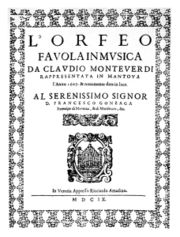February 17, 2006
Gratuitous Musickal Posting (TM)

Yes, I am now going to write about a 400 year old opera, indeed the very first opera - L'Orfeo, by Claudio Monteverdi. It was originally performed in 1607 at the Palazzo Ducale in Mantua. This DVD is of a performance from 2002 in Barcelona's Gran Teatre del Liceu. And I can heartily say that the piece has withstood time very well indeed.
First, I should just say that I love the early Italian baroque. It still retains much of the free-flowing energy of the late Renaissance, yet is just beginning to assemble a more formalized new structure. Here, Monteverdi indulges in all manner of music, from rollicking shepherd dances to sumptuous madrigals. Even if you haven't the faintest idea of what's going on, it's an utter joy just to listen.
The opera tells the story of Orpheus and Eurydice. Orpheus, the greatest singer of all time, but who has moped about Thrace for years and years alone, finally meets the love of his life, Eurydice. However, on the day of their wedding, Eurydice is bitten by a snake and dies. Orpheus determines to go to the Underworld to bring her back. Using his powers of song, he gets past Charon, the ferryman of the River Styx and charms Pluto and Proserpina into letting Eurydice go. Pluto's only condition is that Orpheus may not look at Eurydice as he leads her back up to the living world. Of course, Orpheus does so and Eurydice is immediately carted back off to Hades. A grief-stricken Orpheus is finally led up to Heaven by Apollo, who takes pity on him.
In addition to the solos of these characters, the story is told by a combination of choruses of shepherds and spirits and by a couple of allegorical figures - Musica and Speranza (Hope). In general, the action moves forward via the soloists and the choruses provide commentary. An interesting feature of this particular treatment, first presented to the Duke of Mantua and an informal set of amateur noble philosophers, is that while Orpheus' first loss of Eurydice was a tragic misfortune, his second loss was his own damn fault:
CHORUS of SPIRITSVirtue is a ray
of celestial beauty,
prize of the soul, where alone it is valued.
It does not fear the ravages of time;
on the contrary, with man
the years increase its splendour.
Orpheus conquered Hades and then
was conquered by his emotions.
Worthy of eternal glory is only he
who has victory over himself.
As to the performance here, musically it was first rate. The orchestra and chorus were Le Concert des Nations and La Capella Reial de Catalunya, directed by Jordi Savall (dressed as Monteverdi himself). I'd never heard of him before, but will keep my eyes and ears open now - his period performance sensibilities are exactly to my liking. (It is an irony of the age that although there is virtually no modern music worth performing, the number and quality of performers must easily exceed any other period in history.)
All of the soloists sang beautifully as well. My only criticism here would be that the acting was very uneven. By far the best performance was Sara Mingardo's Sylvia, Eurydice's poor maid who has to break the bad news of her death to Orpheus. Ravishing is the only word to describe it. On the other hand, Furio Zanazi as Orpheus wandered around the stage with a look of vaguely unsatisfied bewilderment the entire time. Dressed in a red toga and carrying a lyre, he looked more like Nero than anyone else. One can't say much of anything of Arianna Savall's Eurydice, because the part doesn't have any more than half a dozen lines throughout the entire opera. The rest of the supporting soloists sang, as I say, very well, and turned in acting performances that varied between the adequate and the good. I have to say, though, that Daniele Carnovich and Adriana Fernaindez, as Pluto and Proserpina, looked like the King and Queen of Hades, Appalachia Division.
Overall, I'd highly recommend this performance if you are interested in getting into the music of Monteverdi. If, on the other hand, you are more interested in getting into the story of L'Orfeo, to experience the opera as theatre, I believe I'd recommend instead Nicolaus Harnocourt's old production (if you can find it). The acting there is much more lively all the way around. And Harnocourt cleverly turns the chorus into a set of Mantuan nobles and their ladies, thereby making them both audience and performers. I have been toying with trying this opera out on the eldest Llama-ette - who is mad keen about classical mythology - and am going to go with the Harnocourt version as her introduction.
By the way, the production values of this DVD are outstanding.
Posted by Robert at February 17, 2006 11:31 AM | TrackBack

 Image courtesy of the lovely and talented
Image courtesy of the lovely and talented 